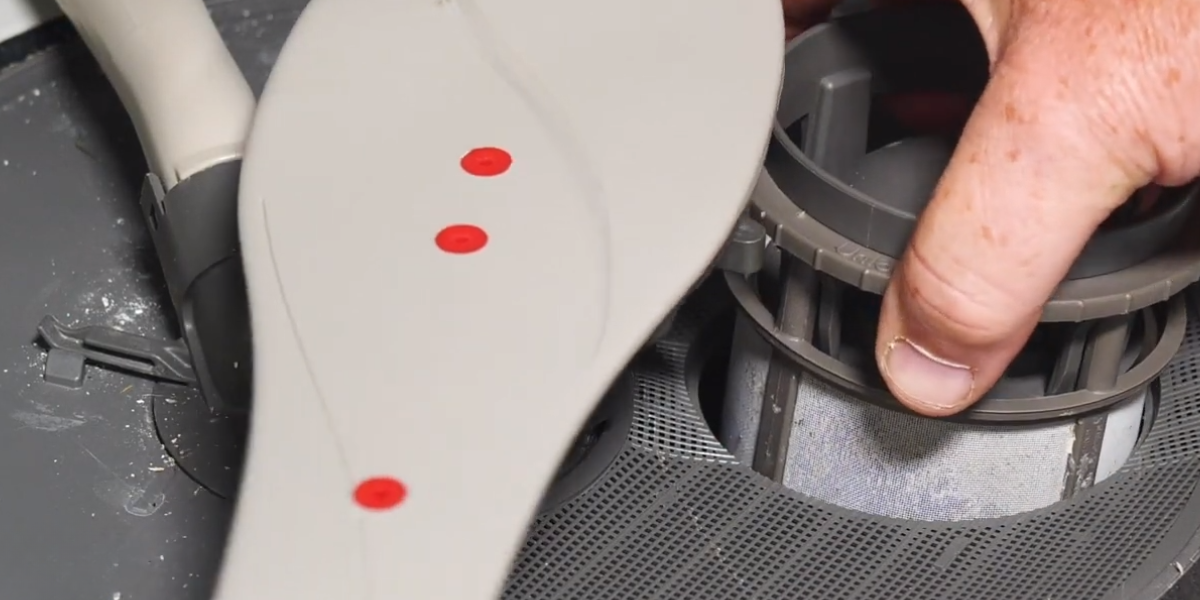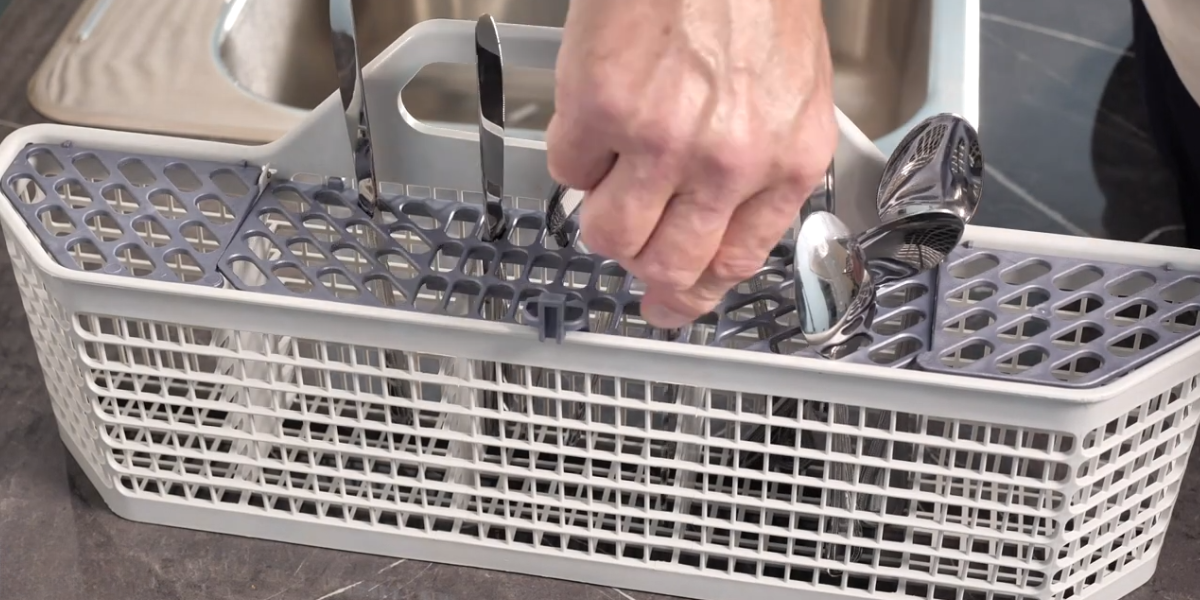5 Simple Tips for a Cleaner and More Efficient Dishwasher
Expert-recommended ways to keep your extend the life of your dishwasher
Dishwashers are well-beloved for their time-saving and efficient dish-cleaning capabilities. However, like all appliances, dishwashers require proper care and attention to stay in optimal condition. Use the 5 expert methods in this guide to not only extend the life of your dishwasher but also ensure it runs like new for longer.
Clean the Dishwasher Filter

Regularly cleaning the filter in your dishwasher is one of the most important parts of maintaining the performance and extending the life of your dishwasher. Over time, food particles and debris get trapped in the filter. A blocked filter will result in several issues such as:
- Restricted water flow and poor drainage.
- Reduced cleaning efficiency from recirculation of dirty water in the dishwasher tub.
- Unpleasant odors from stagnant water at the bottom of the washer.
- Strain on the drain pump and motor as they struggle to push water through the obstructions.
To clean the filter, you will need to first remove it from the base of the dishwasher. Once free, you can scrub the debris and buildup off using a soft brush or cloth, or run it under warm water until it is clean. If the filter is no longer in good working condition, it is recommended to replace it to maintain the cleaning performance of your dishwasher and prevent wear and tear to its internal components.
Use a Descaler to Remove Hard Water
Hard water refers to water that contains a large amount of mineral deposits such as calcium and magnesium. To check whether your home’s water supply contains hard water, you can purchase a testing kit from your local hardware store. Hard water can have several negative effects on your dishwasher:
- Limescale Build-up: Over time, the minerals in hard water can build up on the heating elements and the interior walls of the dishwasher. Your dishwasher will need to run longer cycles or use hotter water to get dishes clean, leading to increased energy and water usage.
- Film on Dishes: Hard water can leave a cloudy film or spots on glassware and dishes. This happens because the minerals in the water settle on the surfaces of the dishes as the water dries.
- Reduced Cleaning: Hard water can interact with the chemicals in detergents and decrease their cleaning power, leaving you with dirty dishes over time.
- Clogged Jets: The spray jets in the dishwasher can become clogged with mineral deposits. This increases the wear and tear on the jets and restricts the flow of water during cleaning.
To reduce the effects of hard water on your dishwasher, you can use a descaling agent which helps to clear limescale buildup from surfaces and prevents spots and films on dishes. You can also look for detergents that are formulated specifically for hard water. These can be more effective at cleaning dishes if your water supply contains hard water.
Ensure that the Water Running to Your Appliance is Hot
Ensure that you turn on the heating element before you run the dishwasher to ensure that the water is at the right temperature for optimal performance. Hot water helps you keep your dishwasher in optimal condition in several ways:
- Effective Cleaning: Hot water helps dissolve detergents more effectively, and clean dishes more effectively. This reduces the strain on your dishes and reduces the chances of blockages in the filter, and other components.
- Degreasing: Hot water can break down and rinse away grease and oils from dishes more effectively than cold water. This also reduces buildup inside the dishwasher's internal components and prevents premature wear and tear on the dishwasher.
- Reduced Bacterial and Fungal Growth: Hot water kills bacteria and fungus, which can sometimes grow inside the dishwasher due to the warmth and dampness present. This prevents foul odors and reduces the risk to your health.
Load Your Dishwasher The Correct Way

Most modern dishwashers have built-in sensors that detect the cleanliness of the dishes. If the dishes aren't loaded properly and cannot receive an adequate amount of soap and water, the dishwasher will run longer and use more energy in order to get them cleaned. Furthermore, incorrectly placed dishes can fall or move around during the cycle, and damage the racks, spray arm or the dishwasher's interior. So, to reduce the strain on your dishwasher and to keep it running efficiently, follow these loading instructions:
- Plates and Bowls: Place them on the bottom rack facing the center, with the bigger plates on the outer edges.
- Pots and Pans:Face them downward on the bottom rack and make sure they are slightly slanted to water to reach and clean the surface.
- Utensils: Place forks, knives, and spoons in the utensil basket. Ensure the knives are facing downward for safety, while forks and spoons can face up.
- Large Utensils: If they don't fit in the utensil basket, lay them flat on the side, and check that they do not block the spray arm.
- Glasses and Cups: Do not place them over the tines, instead, place them between the tines, to prevent water spots and to ensure their stability.
- Plastic Items: To prevent plastic from melting or warping, place plastic items on the top rack away from the heating element which is typically found at the bottom of most dishwashers
- Avoid Overloading: Overloading can block the sprayer arms and prevent water from reaching all the dishes, causing them to remain dirty after the cycle.
Run a Full Load of Dishes
Running a full load in your dishwasher is important for its performance and longevity for several reasons:
Reduced Wear and Tear: Each time you run the dishwasher, parts such as the motor, pump, or heating element undergo wear and tear. By running full loads, you can decrease the total number of cycles your dishwasher goes through, leading to less wear and tear over time.
Energy and Water Efficiency: Running full loads ensures that you maximize the energy and water used by your dishwasher. By using your dishwasher more efficiently, you can potentially reduce the strain on its components.
Chemical Efficiency: Detergents and rinse aids are best used with full loads. Using the same amount of detergent for a few dishes versus using it for a load, can leave with soap residue buildup, which could cause clogs over time.
Heat Exposure: Every cycle exposes the dishwasher's interior, racks, and seals to heat and moisture. Fewer cycles mean that there is less frequent exposure to these conditions, which can help maintain the quality of the dishwasher's components for longer.
By using the simple practices above like loading dishes correctly, and cleaning your dishwasher, you will extend the life of our dishwasher and keep it running like new. Remember, a dishwasher is an investment, and with a little care and attention, you can ensure a clean and hassle-free dishwashing experience for years to come. Taking care of your dishwasher also means repairing it when necessary. If your dishwasher is in need of some new parts, you can browse our selection of genuine dishwasher parts and find the right part for your appliance!
